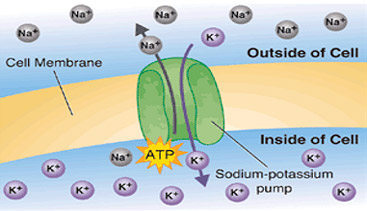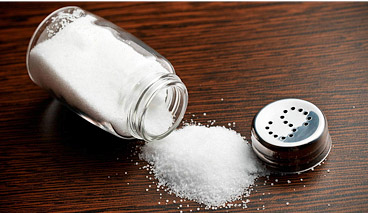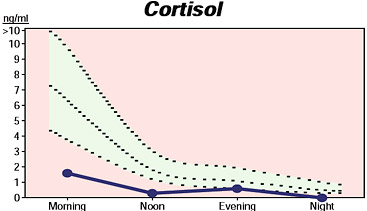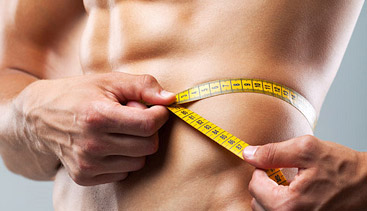7 WAYS TO REDUCE WATER RETENTION FOR BETTER MUSCLE DEFINITION

Water is critical for every aspect of life. After all, your body is almost two-thirds water.
But for those wanting to carve out a lean, defined and muscular body, too much water can sometimes be a bad thing.
I’m talking specifically about subcutaneous water retention – excess fluid that builds up directly beneath the skin and results in a softer, “smoother” looking physique.
You’ve remained disciplined with your training and nutrition from week to week, and the last thing you want is for that hard-earned muscle definition to be blurred over by something as simple as a small layer of extra water weight.
What causes water retention?
There are a variety of factors that can come into play, mainly related to your daily water consumption, sodium/potassium intake and cortisol levels.
Let’s take a closer look and discover what you can do to moderate each of these factors so that excess water retention is kept at a minimum.
Reduce Water Retention & Bloating: 7 Tips
#1 – Increase Your Water Intake.

While it might sound counter-intuitive, drinking more water will actually cause you to retain less.
This is because your body is always aiming to maintain healthy fluid levels, and when you restrict your water consumption, it holds onto a greater amount as a natural survival response.
A consistent intake of water throughout the day will have a natural “flushing” effect since the body will have no incentive to hold on to additional fluids due to the constant external supply it’s receiving.
On top of its ability to decrease water retention and improve muscle definition, adequate water consumption each day provides a huge list of other important benefits as well, such as:
- Maximizing strength and performance.
- Aiding in digestion.
- Detoxifying the body.
- Regulating temperature.
- Improving nutrient absorption.
- Assisting with proper cognitive function.
- Regulating kidney function.
- Improving mood and concentration.
How much water should you drink each day to optimize overall heath and minimize water retention?
There’s no single guideline that will apply to every single person, since the ideal amount varies depending on body weight, activity level, climate and genetic differences.
Instead, a good gauge is to simply look at the color and smell of your urine. If it’s reasonably clear and odorless throughout the day, this is a pretty good indication that your body is adequately hydrated.
For some people that might mean 2 liters daily, while for others it could mean 4 liters, 6 liters or more.
#2 – Balance Your Sodium To Potassium Ratio.

Sodium draws water into cells, while potassium does the opposite and pumps water out.
In order to reduce bloating and keep water retention at a minimum, you’ll ideally want to consume these two minerals in a balanced 1:1 ratio.
Unfortunately, the average Western diet contains more sodium than it does potassium, and by a very hefty margin.
Not only does this contribute to excess fluid retention, but a high sodium to potassium ratio has also been shown to significantly increase heart attack risk.
A few simple ways you can moderate your sodium intake include:
- Reducing your consumption of canned and pre-packaged foods.
- Not excessively salting your foods.
- Watching out for the sodium content of sauces and dressings.
- Minimizing your intake of high sodium fast food meals.
You should also make an effort to get in a few servings of high potassium foods each day if you aren’t doing so already. A few examples include:
- Beans
- Apricots
- Dark leafy greens
- Yogurt
- Bananas
- Potato
- Avocado
- Squash
- Mushrooms
- Salmon
Keep in mind that the “perfect” ratio of sodium to potassium isn’t exactly known, and the 1:1 recommendation is simply an estimate.
The bottom line though is that the majority of people are far too high on sodium and too low on potassium, and balancing this out is a good step for improving overall health and reducing water retention.
#3 – Avoid Large Fluctuations In Sodium Intake.

You’ve probably had the experience of consuming a large, heavily salted meal at a restaurant and then waking up the following morning to a noticeably softer and more bloated looking appearance.
When sodium levels are kept relatively stable over a period of time and then suddenly “spiked” with a much higher amount, excess water retention is a virtual guarantee.
This is due to fluctuations in the body’s levels of a hormone known as “aldosterone” which regulates water balance.
The opposite can happen as well.
Many people mistakenly think that reducing their sodium intake will automatically eliminate water retention and increase muscle definition, but this simply isn’t the case.
Going from a moderate to high sodium intake right down to a low sodium intake can actually have a similar effect and cause you to retain more water and appear even more bloated as a result.
All in all, short term ups and downs in sodium intake are completely normal and will balance out fairly quickly, so it usually isn’t a big deal for the most part.
However, if you’re looking to keep water retention under control from day to day or want to appear leaner and dryer for a specific occasion, constant ups and downs in your sodium intake should be avoided.
#4 – Reduce Your Levels Of Stress.

Stress is a killer. Both in the literal sense by encouraging the development of various diseases, and to your physique by increasing water retention and reducing muscle definition.
This is because stress elevates cortisol levels, which then interferes with ADH or “antidiuretic hormone”.
ADH plays a key role in regulating fluid levels by signaling the kidneys to pump water back into the body.
When cortisol levels remain high for a prolonged period, ADH also stays elevated which can disrupt fluid balance.
To keep your overall health maximized and water levels under control, you’ll want to do the best you can to lower your levels of chronic daily stress.
This can certainly be a challenge given the hectic lives and constant pressure so many of us live with in modern society, but here are a few basic tips you can follow:
- Eat a minimally processed, whole food diet with plenty of fruits and vegetables.
- Exercise regularly.
- Reduce your levels of work-related stress as much as possible.
- Spend quality time with friends and family.
- Increase your sexual activity.
- Take up hobbies you enjoy.
- Make time to fully unwind and relax.
- Get outside into nature.
- Laugh more.
- Try meditating.
#5 – Get A Proper Sleep Each Night.

Just as repetitive daily stress can increase cortisol levels and lead to water retention and bloating, so can an improper sleeping schedule.
In fact, getting a sufficient amount of deep, restful sleep on a consistent basis is a far more important factor when it comes to maximizing muscle growth, fat loss and overall health than most people realize.
Not only will it help to reduce water retention, but it will also keep your energy levels, strength, mood and concentration at their peak, optimize important muscle building and fat burning hormones such as testosterone and IGF-1, and improve the efficiency at which your body utilizes fat for energy rather than muscle by reducing RER (respiratory exchange rate).
Here are 7 useful sleep tips you can apply to reduce the amount of time that it takes you to fall asleep and help you sleep more deeply and for longer periods of time…
1) Maintain a steady sleep schedule by going to bed and waking up at the same time each day.
2) Keep your room as dark as possible and at a cool temperature.
3) Stop looking at electronic light (TV, laptops, phones etc.) about 30 minutes before nodding off, or at the very least use a blue-light filter on your devices.
4) Eliminate sudden noises by keeping your room as quiet as possible or by using background white noise such as a fan or air conditioner.
5) Avoid going to sleep too full or too hungry.
6) Steer clear of caffeine and other stimulants within 6-8 hours of sleep.
7) Experiment with research-backed sleep supplements such as melatonin, magnesium, glycine or lavender oil.
#6 – Avoid Overtraining

While overtraining certainly isn’t going to happen over night, it can gradually creep up on you if you’re maintaining excessive training volume and/or intensity over a prolonged period.
When you’re in an overtrained state, cortisol levels rise and testosterone levels falls.
Not only is this bad news when it comes to building muscle, losing fat and gaining strength, but it will also increase unwanted water retention as well.
Aside from a generally softer and more bloated looking physique, a few of the main signs and symptoms of overtraining include:
- Stagnation or decreases in strength levels.
- Getting burned out and overly fatigued midway through workouts.
- Consistently feeling tired throughout the day.
- Increased frequency of illness.
- Aching joints.
- Diminished quality of sleep.
- Decreased sex drive.
- Loss of motivation to train.
- Elevated resting heart rate.
You can minimize the chances of overtraining by moderating your weekly training volume and intensity, incorporating deloads/rest weeks into your schedule, ensuring that nutrition and sleep are on point and reducing day to day stress levels.
#7 – Don’t Diet Too Aggressively.

Following a similar theme here, overly aggressive calorie deficits that are maintained for a prolonged period also increase cortisol levels.
This seems to happen in a dose-dependent manner as well, meaning the larger your calorie deficit is, the more likely you’ll be to hold onto excess water weight.
Yes, eating in a calorie deficit is an absolute requirement when it comes to losing fat, but if you want to prevent excess water retention (and muscle loss) throughout your cutting phase, a moderate approach is usually best.
More aggressive deficits are often fine in the short term if it’s only for a few weeks, but a good guideline for steady, effective fat loss over a longer period is to eat about 300-500 calories below your maintenance level.
This amount is large enough to stimulate significant fat loss from week to week, but small enough that fluid balance won’t be disrupted.
Refeeds can also be a useful strategy to maintain balanced hormonal levels while dieting and keep water retention at bay.
You may actually notice that your weight goes down slightly the morning after a refeed, and this is due to the decrease in cortisol that results from the higher calories.
Bodybuilders often call this phenomenon of excess fluid release a “water whoosh”.
Quick Review: What Causes Water Retention & How To Get Rid Of It

The main causes of excess water retention are centered around inadequate water consumption, unbalanced sodium and potassium intake, and elevated cortisol levels.
In order to maximize muscle definition and carve out a dryer, harder looking physique, there are several steps you can take to properly address each of these factors.
To sum it up…
- Drink plenty of water throughout the day.
- Maintain a balanced ratio of sodium to potassium.
- Keep your sodium intake relatively consistent from day to day.
- Lower your levels of daily stress.
- Get a good restful sleep each night.
- Moderate your training volume/frequency to avoid overtraining.
- Avoid excessively aggressive calorie deficits over prolonged periods.
Although applying these tips won’t completely eliminate water retention altogether, they’ll go a long way in keeping it minimized and at a healthy balanced level.
If you found this article helpful, make sure to sign up for your FREE custom fitness plan below...




